- Home
- Philip Roth
When She Was Good
When She Was Good Read online
Philip Roth
When She Was Good
In 1997 Philip Roth won the Pulitzer Prize for American Pastoral. In 1998 he received the National Medal of Arts at the White House and in 2002 the highest award of the American Academy of Arts and Letters, the Gold Medal in Fiction, previously awarded to John Dos Passos, William Faulkner, and Saul Bellow, among others. He has twice won the National Book Award and the National Books Critics Circle Award. He has won the PEN/Faulkner Award three times. In 2005 The Plot Against America received the Society of American Historians’ prize for “the outstanding historical novel on an American theme” for 2003–2004. In 2006 Roth received PEN’s most prestigious prize, the PEN/Nabokov Award for a “body of work … of enduring originality and consummate craftsmanship.” Roth is the only living American writer to have his work published in a comprehensive, definitive edition by the Library of America. The last of the eight volumes is scheduled for publication in 2013.
Books by Philip Roth
ZUCKERMAN BOOKS
The Ghost Writer
Zuckerman Unbound
The Anatomy Lesson
The Prague Orgy
Exit Ghost
The Counterlife
American Pastoral
I Married a Communist
The Human Stain
ROTH BOOKS
The Facts • Deception
Patrimony • Operation Shylock
The Plot Against America
KEPESH BOOKS
The Breast
The Professor of Desire
The Dying Animal
MISCELLANY
Reading Myself and Others
Shop Talk
OTHER BOOKS
Goodbye, Columbus • Letting Go
When She Was Good • Portnoy’s Complaint • Our Gang
The Great American Novel • My Life as a Man
Sabbath’s Theater • Everyman
FIRST VINTAGE INTERNATIONAL EDITION,
FEBRUARY 1995
Copyright © 1966, 1967 by Philip Roth
All rights reserved under International and Pan-American Copyright Conventions. Published in the United States by Vintage Books, a division of Random House, Inc., New York, and simultaneously in Canada by Random House of Canada Limited, Toronto. Originally published in hardcover by Random House, a division of Random House, Inc., New York, in 1966.
Sections of this book have appeared, in slightly different form, in the Atlantic, Harper’s, and the Saturday Evening Post.
Lyrics from the following songs are used by permission:
“Nature Boy” by Eden Ahbez. Copyright 1948 by Crestview Music Corporation, New York. Sole Selling Agent: Ivan Mogull Music Corporation, New York, N.Y.
“Anniversary Song,” by Al Jolson. Copyright 1946 by Mood Music Co., Inc. N.Y.C. Sole Selling Agent: Shapiro, Bernstein & Co., Inc.
“A Tree in the Meadow,” by Billy Reid. Copyright 1947 by Campbell-Connelly Inc., New York. Sole Selling Agent: Shapiro, Bernstein & Co., Inc.
“It’s Magic,” by Jules Stein. Copyright 1948 by M. Witmark & Sons.
Library of Congress Cataloging-in-Publication Data
Roth, Philip.
When She Was Good/Philip Roth. — 1st Vintage International ed.
p. cm.
eISBN: 978-0-307-78860-3
1. Middle West—Moral conditions—Fiction. 2. Fathers and daughters—Middle West—Fiction. 3. Married women—Middle West—Fiction. I. Title.
PS3568.0855W46 1995
813′.54—dc20 94-31360
v3.1
To my brother Sandy;
to my friends Alison Bishop, Bob Brustein,
George Elliott, Mary Emma Elliott,
Howard Stein, and Mel Tumin;
and to Ann Mudge:
For words spoken and deeds done
Contents
Cover
About the Author
Other Books by This Author
Title Page
Copyright
Dedication
Part One Chapter 1
Part Two Chapter 1
Chapter 2
Chapter 3
Part Three Chapter 1
Chapter 2
One
1
Not to be rich, not to be famous, not to be mighty, not even to be happy, but to be civilized—that was the dream of his life. What the qualities of such a life were he could not have articulated when he left his father’s house, or shack, in the northern woods of the state; his plan was to travel all the way down to Chicago to find out. He knew for sure what he didn’t want, and that was to live like a savage. His own father was a fierce and ignorant man—a trapper, then a lumberman, and at the end of his life, a watchman at the iron mines. His mother was a hard-working woman with a slavish nature who could never conceive of wanting anything other than what she had; or if she did, if she was really other than she seemed, she felt it was not prudent to speak of her desires in front of her husband.
One of Willard’s strongest boyhood recollections is of the time a full-blooded Chippewa squaw came to their cabin with a root for his sister to chew when Ginny was incandescent with scarlet fever. Willard was seven and Ginny was one and the squaw, as Willard tells it today, was over a hundred. The delirious little girl did not die of the disease, though Willard was later to understand his father to believe it would have been better if she had. In only a few years they were to discover that poor little Ginny could not learn to add two and two, or to recite in their order the days of the week. Whether this was a consequence of the fever or she had been born that way, nobody was ever to know.
Willard never forgot the brutality of that occurrence, which for him lay in the fact that nothing was to be done, for all that what was happening was happening to a one-year-old child. What was happening—this was more his sense of it at the time—was even deeper than his eyes … In the process of discovering his personal attractiveness, the seven-year-old had lately discovered that what someone had at first denied him would sometimes be conceded if only he looked into the other’s eyes long enough for the honesty and intensity of his desire to be appreciated—for it to be understood that it wasn’t just something he wanted but something he needed. His success, though meager at home, was considerable at the school in Iron City, where the young lady teacher had taken a great liking to the effervescent, good-humored and bright little boy. The night Ginny lay moaning in her crib Willard did everything he could to catch his father’s attention, but the man only continued spooning down his dinner. And when finally he spoke, it was to tell the child to stop shuffling and gaping and to eat his food. But Willard could not swallow a single mouthful. Again he concentrated, again he brought all his emotion up into his eyes, wished with all his heart—and a pure selfless wish too, nothing for himself; never would he wish anything for himself again—and fixed his plea on his mother. But all she did was to turn away and cry.
Later, when his father stepped out of the shack and his mother took the dishes to the tub, he moved across the darkened room to the corner where Ginny lay. He put his hand into the crib. The cheek he touched felt like a sack of hot water. Down by the baby’s burning toes he found the root the Indian woman had brought to them that morning. Carefully he wrapped Ginny’s fingers around it, but they unbent the moment he let go. He picked up the root and pressed it to her lips. “Here,” he said, as though beckoning to an animal to eat from his hand. He was forcing it between her gums when the door opened. “You—let her be, get away,” and so, helpless, he went off to his bed, and had, at seven, his first terrifying inkling that there were in the universe forces even more immune to his charm, even more remote from his desires, even more estranged from human need and feeling, than his own father.
&n
bsp; Ginny lived with her parents until the end of her mother’s life. Then Willard’s father, an old hulk of a thing by this time, moved into a room in Iron City, and Ginny was taken to Beckstown, off in the northwestern corner of the state, where the home for the feeble-minded used to be. It was nearly a month before the news of what his father had done reached Willard. Over his own wife’s objections, he got into the car that very evening and drove most of the night. At noon the following day he returned home with Ginny—not to Chicago, but to the town of Liberty Center, which is a hundred and fifty miles down the river from Iron City, and as far south as Willard had gotten when at the age of eighteen he had decided to journey out into the civilized world.
Since the war the country town that Liberty Center used to be has given way more and more to the suburb of Winnisaw it will eventually become. But when Willard first came to settle, there was not even a bridge across the Slade River connecting Liberty Center on the east shore to the county seat on the west; to get to Winnisaw, you had to take a ferry ride from the landing, or in deep winter, walk across the ice. Liberty Center was a town of small white houses shaded by big elms and maples, with a bandstand in the middle of Broadway, its main street. Bounded on the west by the pale flow of river, it opens out on the east to dairy country, which in the summer of 1903, when Willard arrived, was so deeply green it reminded him—a joke for the amusement of the young—of a fellow he once saw at a picnic who had eaten a pound of bad potato salad.
Until he came down from the north, “outside of town” had always meant to him the towering woods rolling up to Canada, and the weather roaring down, waves of wind, of hail, of rain and snow. And “town” meant Iron City, where the logs were brought to be milled and the ore to be dumped into boxcars, the clanging, buzzing, swarming, dusty frontier town to which he walked each schoolday—or in winter, when he went off in a raw morning dimness, ran—through woods aswarm with bear and wolf. So at the sight of Liberty Center, its quiet beauty, its serene order, its gentle summery calm, all that had been held in check in him, all that tenderness of heart that had been for eighteen years his secret burden, even at times his shame, came streaming forth. If ever there was a place where life could be less bleak and harsh and cruel than the life he had known as a boy, if ever there was a place where a man did not have to live like a brute, where he did not have to be reminded at every turn that something in the world either did not like mankind, or did not even know of its existence, it was here. Liberty Center! Oh, sweet name! At least for him, for he was indeed free at last of that terrible tyranny of cruel men and cruel nature.
He found a room; then he found a job—he took an examination and scored high enough to become postal clerk; then he found a wife, a strong-minded and respectable girl from a proper family; and then he had a child; and then one day—the fulfillment, he discovered, of a very deep desire—he bought a house of his own, with a front porch and a backyard: downstairs a parlor, a dining room, a kitchen and a bedroom; upstairs two bedrooms more and the bath. A back bathroom was built downstairs in 1915, six years after the birth of his daughter, and following his promotion to assistant postmaster of the town. In 1962 the sidewalk out front had to be replaced, a whacking expense for a man now on a government pension, but one that had to be, for the pavement had buckled in half a dozen places and become a hazard to passers-by. Indeed, to this very day, when his famous agility, or jumpiness, has all but disappeared; when several times in an afternoon he finds himself in a chair which he cannot remember having settled into, awakening from a sleep he cannot remember needing; when at night to undo his laces produces a groan he does not even hear; when in his bed he tries for minutes on end to roll his fingers into a fist, and sometimes must go off to sleep having failed in the attempt; when at the end of each month he looks at the fresh new calendar page and understands that there on the pantry door is the month and the year in which he will most assuredly die, that one of those big black numerals over which his eye is slowly moving is the date upon which he is to disappear forever from the world—he nevertheless continues to attend as quickly as he is able to a weak porch rail, or the dripping of a spigot in the bathroom, or a tack come loose from the runner in the hall—and all this to maintain not only the comfort of those who live with him yet, but the dignity of all too, such as it is.
One afternoon in November of 1954, a week before Thanksgiving, and just at dusk, Willard Carroll drove out to Clark’s Hill, parked down by the fence, and on foot climbed the path until he reached the family plot. The wind was growing colder and stronger by the minute, so that by the time he had reached the top of the hill, the bare trees whose limbs had only been clicking together when he left the car were now giving off a deep groaning sound. The sky swirling overhead had a strange light to it, though below, it already appeared to be night. Of the town he was able to discern little more than the black line of the river, and the head lamps of the cars as they moved along Water Street toward the Winnisaw Bridge.
As though this of all places had been his destination, Willard sank down onto the cold block of bench that faced the two stones, raised the collar of his red hunting jacket, pulled on the flaps of his cap, and there, before the graves of his sister Ginny and his granddaughter Lucy, and the rectangles reserved for the rest of them, he waited. It began to snow.
Waiting for what? The stupidity of his behavior dawned quickly. The bus he had left the house to meet would be pulling up back of Van Harn’s store in a few minutes; from it Whitey was going to disembark, suitcase in hand, whether his father-in-law sat here in a freezing cemetery or not. Everything was in readiness for the homecoming, which Willard had himself helped to bring about. So what now? Back out? Change his mind? Let Whitey find himself another sponsor—or sucker? That’s right, oh, that’s it exactly—let it get dark, let it get cold, and just sit it out in the falling snow … And the bus will pull in and the fellow will get off and head into the waiting room, all brimming over with how he has taken someone in once again—only to find that this time no sucker named Willard is waiting in the waiting room.
But at home Berta was preparing a dinner for four; on the way out the kitchen door to the garage, Willard had kissed her on the cheek—“It’s going to be all right, Mrs. Carroll,” but he might have been talking to himself for all the response he received. As a matter of fact, that’s who he was talking to. He had backed the car down the driveway and looked up to the second floor, where his daughter Myra was rushing around her room so as to be bathed and dressed when her father and her husband came through the door. But saddest of all, most confusing of all, a little light was on in Lucy’s room. Only the week before, Myra had pushed the bed from one end of the room to the other, and taken down the curtains that had hung there all those years, and then gone out and bought a new bedspread, so that at least it no longer looked like the room in which Lucy had slept, or tried to sleep, the last night she had ever spent in the house. Of course, on the subject of how and where Whitey was to spend his nights, what could Willard do but be silent? Secretly it was a relief that Whitey was to be “on trial” in this way—if only it could have been in a bed other than that one.
And over in Winnisaw, Willard’s old friend and lodge brother Bud Doremus was expecting Whitey to show up for work at his hardware supply house first thing Monday morning. The arrangements with Bud dated back to the summer, when Willard had agreed to accept his son-in-law once again into his house, if only for a while. “Only for a while” was the guarantee he had made to Berta; because she was right, this just could not be a repetition of 1934, with someone in need coming for a short stay and managing somehow to stretch it out to sixteen years of living off the fat of another fellow’s land, which wasn’t so fat either. But of course, said Willard, that other fellow did happen to be the father of the man’s wife—And just what does that mean, Berta asked, that it is going to be sixteen years again this time too? Because you are certainly still father to his wife; that hasn’t changed any. Berta, I don’t imagine for one th
ing that I have got sixteen years left to me, first of all. Well, said she, neither do I, which might be just another reason not even to begin. You mean just let them go off on their own? Before I even know whether the man really is changed over or not? asked Willard. And what if he really has reformed, once and for all? Oh sure, said Berta. Well, sneering at the idea may be your answer, Berta, but it just does not happen to be mine. You mean it does not happen to be Myra’s, she said. I am open to opinion from all sides, he said, I will not deny that, why should I? Well then, maybe you ought to be open to mine, Berta said, before we start this tragedy one more time. Berta, he said, till January the first I am giving the man a place to get his bearings in. January the first, she said, but which year? The year two thousand?
Seated alone up in the cemetery, the tree limbs rising in the wind, and the dark of the town seemingly being drawn up into the sky as the first snow descended, Willard was remembering the days of the Depression, and those nights too, when sometimes he awoke in the pitch-black and did not know whether to tremble or be glad that someone in need of him was asleep in every bed of the house. It had been only six months after going off to Beckstown to rescue Ginny from her life among the feeble-minded that he had opened the door to Myra and Whitey and their little three-year-old daughter, Lucy. Oh, he can still remember the tiny, spirited, golden-haired child that Lucy had been—how lively and bright and sweet. He can remember when she was first learning to care for herself, how she used to try to pass what she knew on to her Aunt Ginny, but how Ginny, the poor creature, was barely able to learn to perform the simplest body functions, let alone mastering the niceties of tea parties, or the mystery of rolling two little white socks together to make a ball.
Oh, yes, he can remember it all. Ginny, a fully grown, fully developed woman, looking down with that pale dopey face for Lucy to tell her what to do next—and little Lucy, who was then no bigger than a bird. Behind the happy child, Ginny would go running across the lawn, the toes of her high shoes pointing out, and taking quick little steps to keep up—a strangely beautiful scene, but a melancholy one, too, for it was proof not only of their love for each other, but of the fact that in Ginny’s brain so many things were melted together that in real life are separate and distinct. She seemed always to think that Lucy was somehow herself—that is, more Ginny, or the rest of Ginny, or the Ginny people called Lucy. When Lucy ate an ice cream, Ginny’s eyes would get all happy and content, as though she were eating it herself. Or if as a punishment Lucy was put to bed early, Ginny, too, would sob and go off to sleep like one doomed … a different kind of scene, which would leave the rest of the family subdued and unhappy.

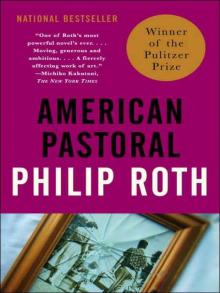 American Pastoral
American Pastoral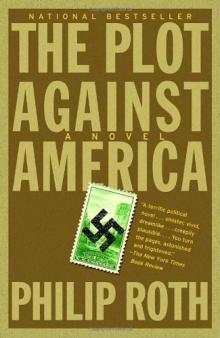 The plot against America
The plot against America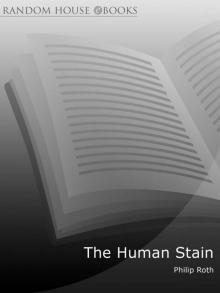 The Human Stain
The Human Stain Nemesis n-4
Nemesis n-4 Sabbath’s Theater
Sabbath’s Theater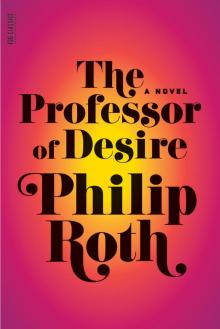 The Professor of Desire
The Professor of Desire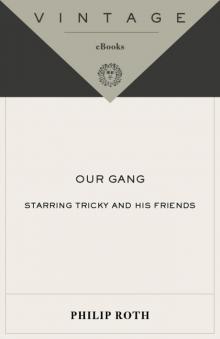 Our Gang
Our Gang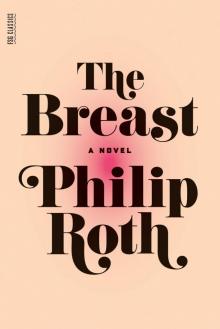 The Breast
The Breast Operation Shylock
Operation Shylock The Dying Animal
The Dying Animal Letting Go
Letting Go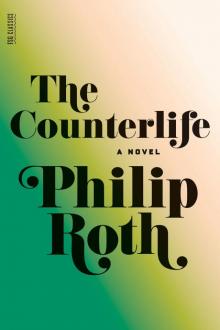 The Counterlife
The Counterlife Everyman
Everyman Nemesis
Nemesis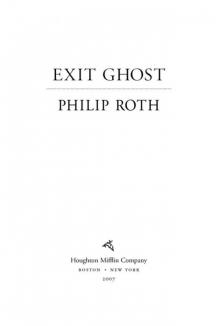 Exit Ghost
Exit Ghost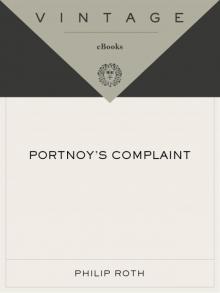 Portnoy's Complaint
Portnoy's Complaint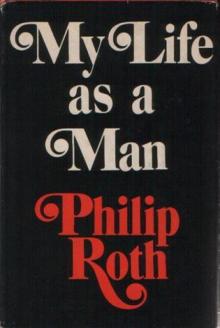 My Life as a Man
My Life as a Man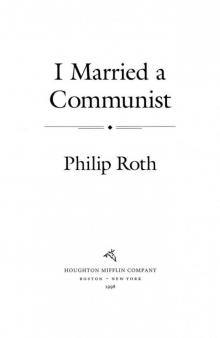 I Married a Communist
I Married a Communist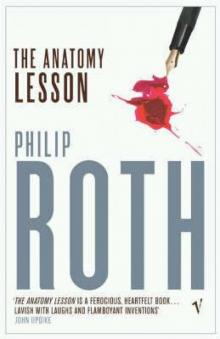 The Anatomy Lesson
The Anatomy Lesson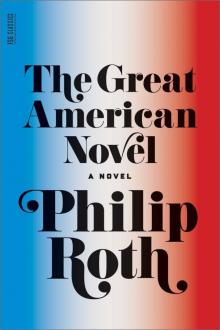 The Great American Novel
The Great American Novel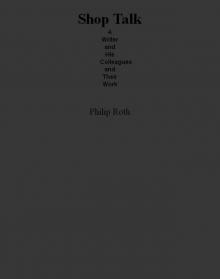 Shop Talk
Shop Talk The Humbling
The Humbling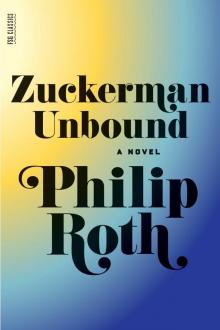 Zuckerman Unbound
Zuckerman Unbound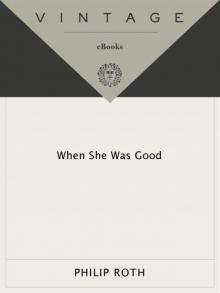 When She Was Good
When She Was Good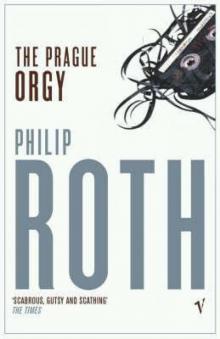 The Prague Orgy
The Prague Orgy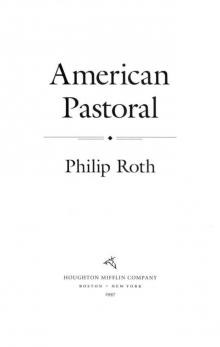 American Pastoral (Nathan Zuckerman)
American Pastoral (Nathan Zuckerman) Goodbye, Columbus
Goodbye, Columbus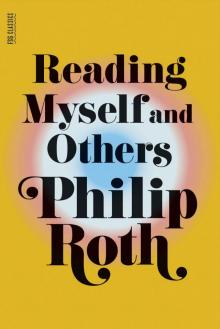 Reading Myself and Others
Reading Myself and Others